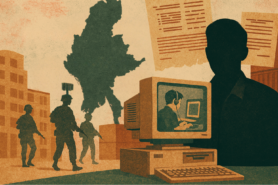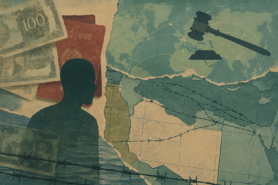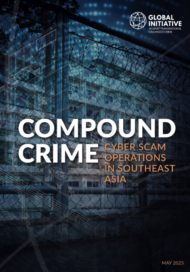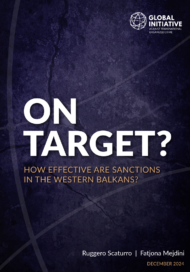Posted on 28 Oct 2025
On 14 October 2025, the US government charged Chen Zhi, founder of the Cambodia-based multinational business conglomerate Prince Group, for allegedly masterminding a vast criminal empire involving the operation of cyber scam compounds, where victims are forced to conduct online scams. As part of a joint operation involving the seizure of more than US$14 billion in bitcoin and 19 properties in London, the US and the UK also imposed sanctions on Chen and over 100 associated businesses and individuals.
This is the most significant enforcement action to date against individuals linked to South East Asia’s cyber scam industry. Although illicit activities do not necessarily cease when sanctions are issued, they can disrupt and reshape criminal ecosystems, and address related harms. One such harm is ‘lawfare’: the use of legal systems to intimidate and silence journalists, researchers and whistle-blowers.
Lawfare includes vexatious lawsuits and strategic lawsuits against public participation, intended to harass and financially drain a defendant. Lawfare is also sometimes associated with litigation tourism, whereby plaintiffs file lawsuits in favourable jurisdictions with strict defamation laws, even when the defendant has little or no connection to that legal system.
This is a significant concern for those reporting on cyber scam operations in South East Asia. These operations generate tens of billions of US dollars annually, meaning the criminal groups behind them have substantial financial resources – especially compared to the researchers, NGOs and media outlets working to expose their activities.
For example, in 2022, Hun To, the cousin of Cambodia’s prime minister, sued The Australian over an article that linked him to cyber scam operations. Following litigation in the Federal Court of Australia, The Australian retracted its allegations in 2024 and removed the story from its website. Hun To also sued Al Jazeera through the Australian courts over a documentary alleging that companies in the Heng He Group, which comprises several companies listing Hun as director, ‘imprison and horrifically abuse human slaves in compounds in Cambodia with impunity’. As noted in the court documents, the plaintiff appears to have argued that these allegations influenced the Australian government’s decision not to renew his residency visa and caused serious harm to his reputation. As of October 2025, the case was still ongoing.
In many jurisdictions, the plaintiff does not need to argue that allegations were false to initiate legal proceedings: the legal burden is on the defendant to prove that what they said was true. The costs of gathering evidence, securing witness testimony and navigating complex legal systems can be high, and defendants bear the risk of losing on procedural or technical grounds. If defamation can be tried as a criminal, rather than a civil, offence (as is the case in many jurisdictions) the defendants could also face a prison sentence.
To meet the legal threshold for defamation, the defendant generally needs to be the source of the allegation. If they can attribute this clearly to an external source – especially official, publicly available statements by a recognized authority – they are unlikely to be held responsible. Although attribution to an external source does not in itself shield a defendant from defamation liability, the reliability and credibility of the source being cited will increase the likelihood that the statement is in fact true.
It is here that sanctions can have a real impact on lawfare. A report based on an official or authoritative source – such as a sanctions notice – rests on a foundation that would generally be regarded as trustworthy, and thus more likely to withstand factual scrutiny. When states issue sanctions or public designations, they often include detailed statements about the basis for those actions. This can open space for civil society actors to report or analyze those allegations with reduced defamation risk, provided they attribute them correctly, avoid asserting them as their own conclusions and ensure their reporting is accurate. Done carefully, this facilitates legitimate public-interest discussion and further investigation into organized criminal activity.
In South East Asia, individuals and entities sanctioned for their alleged involvement in cyber scam operations constitute only a fraction of the industry, but these names are often mentioned precisely because sanctioning them makes it comparatively safe to do so. This was illustrated in August 2024 when a Cambodian news outlet reported that two casinos were scam compounds, citing the same sources and evidence for allegations against both. Press Freedom Monitoring in Southeast Asia, which collects data on threats against journalists, reported that one casino sued the outlet; the other, which had been sanctioned in 2024 did not, even though the owner had successfully used lawfare to have Cambodian critics imprisoned before.
By countering lawfare through strategic revelation, sanctioning states can support efforts to expose criminal activities and bring them into the public sphere. This can encourage reporting that draws attention to how these ecosystems operate and the associated harms. This may help disrupt operations, deter similar activities and promote adherence to international norms. At the same time, reporting on illicit activities can help sanctioning entities monitor the effect of sanctions on the criminal landscape. This information can then be used to improve strategies to combat organized crime more effectively.
However, this synergy could be strengthened by considering the implications for civil society when drafting sanctions announcements, including avoiding ambiguity and providing a rationale for who is and who is not included. For example, UK- and US-led sanctions in 2023 and 2025 designated the Heng He Casino in Cambodia for facilitating human trafficking and abuse, yet did not designate all the owners and directors. Hun To is the director of a number of Heng He Group companies, but was not targeted in either of the sanctions packages. He has now been named on a list published by the US Congress, which asks the US president to determine whether he meets the statutory criteria for sanctions to be imposed.
Ultimately, sanctions and civil society reporting can be viewed as interconnected elements of a strategy to counter organized crime. The latest designations in South East Asia send an important signal that the US and the UK are monitoring the situation closely, have gathered significant evidence on these illicit networks, and are prepared to expose and isolate those involved. While sanctions alone are insufficient to stop criminal activity, they lay the groundwork for transparent public-interest reporting, providing space for the media and civil society to conduct investigations into dangerous criminal ecosystems.



